Outcomes
 On July 1, 2016 the 5th CENTRAL RUSSIAN ECONOMIC FORUM took place in Kursk
On July 1, 2016 the 5th CENTRAL RUSSIAN ECONOMIC FORUM took place in Kursk
For the fifth time, the hospitable Kursk region hosted the Central Russian Economic Forum which set an all-time record of more than 2,000 participants from 16 regions of Russia and 8 foreign countries (Germany, Israel, Bulgaria, Belarus, India, Indonesia, etc.).
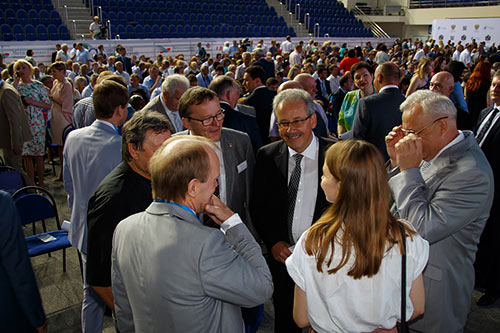 The Forum benefited from the participation and support of the Presidential Plenipotentiary Envoy to the Central Federal District, Russia's Ministry of Economic Development, Ministry of Industry and Trade, Ministry of Agriculture, Chamber of Commerce and Industry. CEF 2016 was traditionally organized by the government of Kursk region, the Investment Attraction Agency of Kursk region and AK&M Information Agency.
The Forum benefited from the participation and support of the Presidential Plenipotentiary Envoy to the Central Federal District, Russia's Ministry of Economic Development, Ministry of Industry and Trade, Ministry of Agriculture, Chamber of Commerce and Industry. CEF 2016 was traditionally organized by the government of Kursk region, the Investment Attraction Agency of Kursk region and AK&M Information Agency.
In the course of its history, the Forum has become a landmark event in the life of Central Russia’s regions highlighting the most topical issues of today’s economic reality.
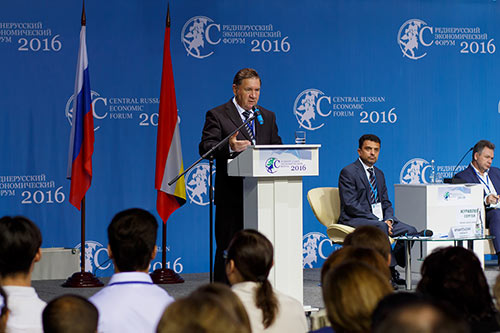 The main Forum theme in 2016 was “Economy in the Interest of New Generations.” The development strategies of Russia and its regions should be primarily aimed at ensuring a decent living standard for future generations. There is a therefore a strong reason for choosing the “Pioneer” painting by well-known artist Aleksandr Deyneka exhibited in the Kursk Art Gallery as a symbol for the CEF 2016 Forum.
The main Forum theme in 2016 was “Economy in the Interest of New Generations.” The development strategies of Russia and its regions should be primarily aimed at ensuring a decent living standard for future generations. There is a therefore a strong reason for choosing the “Pioneer” painting by well-known artist Aleksandr Deyneka exhibited in the Kursk Art Gallery as a symbol for the CEF 2016 Forum.
Alexander Beglov, Presidential Plenipotentiary Envoy to the Central Federal District, greeted the Forum participants. “For five years, the Central Russian Economic Forum has become a prominent event in the business and political life of the whole country,” he said. “One of the key Forum topics will be implementation of the economic development priorities formulated by the President, including productivity improvement, creation of new highly effective jobs, development of knowledge-intensive industries. The key element of the Russian Central Federal district’s economy is the manufacturing industry, with highly efficient jobs mostly created at industrial enterprises and in technology parks. 40% of the Russian universities, 11 of the 13 science towns are located in the Central Federal district. At the same time, the district is strengthening its positions in the agricultural segment. In particular, Kursk region is one of Russia’s leading agricultural producers.”
Other priorities include the development of small and medium-sized businesses as the main source of new jobs, Alexander Beglov said. There is an obvious need to create all conditions for the development of this economic sector, to eliminate red tape, to ensure favorable business conditions. “Being highly mobile and flexible, small and medium-sized businesses can quickly occupy popular niche markets, making the economy more effective. At the same time, SME is one of the most vulnerable sectors. They are highly susceptible to overregulation and bureaucracy,” Alexander Beglov reminded.
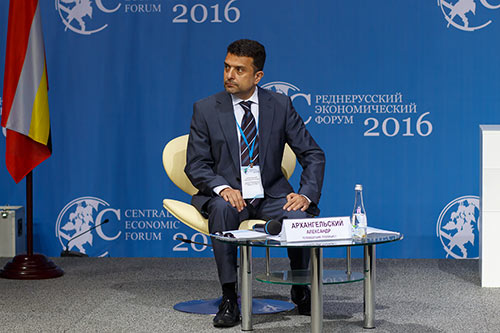 Kaluga and Kursk regions are among the 20 federal subjects with the best investment climate, according to the national investment climate rating. The current objective is to achieve investment growth in all regions of the Central Federal District, the Presidential Plenipotentiary Envoy emphasized.
Kaluga and Kursk regions are among the 20 federal subjects with the best investment climate, according to the national investment climate rating. The current objective is to achieve investment growth in all regions of the Central Federal District, the Presidential Plenipotentiary Envoy emphasized.
Chair of the Federation Council Valentina Matvienko also welcomed the Forum participants. “Our current challenges require new public administration approaches and wider use of the project principle. Projects aimed at increasing productivity, supporting small and medium-sized businesses should be prioritized,” she said wishing the Forum participants effective and rewarding work.
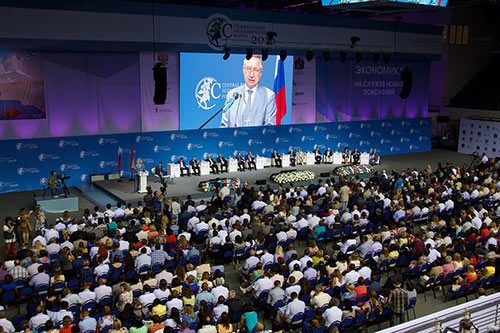 Sergey Katyrin, the President of Russia’s Chamber of Commerce and Industry, also regards development of small and medium businesses as the top-priority objective. The first strategic problem in the development of small businesses is undermotivation of regional and municipal authorities, he said speaking at the Forum. Where income is the item of taxation under the simplified taxation scheme, the tax rate can be lowered from 6% to 1% by virtue of local laws of Russia’s federal subjects. However, this opportunity is only provided in 22 of the 85 federal subjects. Municipal entities have no incentives to reduce the rate of single tax on imputed earnings from 15% to 7.5%. What Russia needs is economic decentralization spurring local government authorities to develop businesses and therefore, to leverage the whole of their resources, the CCI President said.
Sergey Katyrin, the President of Russia’s Chamber of Commerce and Industry, also regards development of small and medium businesses as the top-priority objective. The first strategic problem in the development of small businesses is undermotivation of regional and municipal authorities, he said speaking at the Forum. Where income is the item of taxation under the simplified taxation scheme, the tax rate can be lowered from 6% to 1% by virtue of local laws of Russia’s federal subjects. However, this opportunity is only provided in 22 of the 85 federal subjects. Municipal entities have no incentives to reduce the rate of single tax on imputed earnings from 15% to 7.5%. What Russia needs is economic decentralization spurring local government authorities to develop businesses and therefore, to leverage the whole of their resources, the CCI President said.
Another matter concerning the whole business community is non-tax payments (water treatment rates, solid waste management rates, etc.). While not qualifying as taxes, these payments are mandatory, their volume reaching approximately 1% of the GDP, Sergey Katyrin added. According to the Chamber of Commerce and Industry’s estimates, the number of such payments exceeds 50 on the federal level and 70 in some regions. The situation calls for proper regulation to reduce the number of non-tax payments and to form their register.
Other problems mentioned by Sergey Katyrin include the complexity of SME participating in public procurement procedures due to the lack of transparency and corruption in this sector and excessive unscheduled inspections of businesses (with 1.18 million inspections conducted in Russia in 2015, against the 824 thousand scheduled inspections), insufficient access of SME businesses to financial resources, etc. Only consistent interaction at all levels (municipality, region, federal government) can solve these issues and ensure the development of small businesses in Russia.
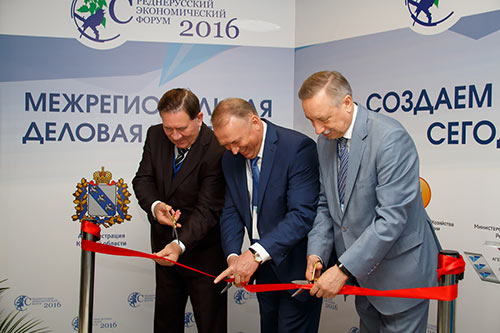 Dieter Dombrowski, Vice President of the Landtag of Brandenburg (Brandenburg State Parliament), highlighted the importance of developing inter-state economic relations in his Forum speech. He announced the signing of a tripartite agreement for the establishment of a center for economic interaction and cooperation in Kursk region during the 16th Kursk Korenskaya Fair on July 2-3.
Dieter Dombrowski, Vice President of the Landtag of Brandenburg (Brandenburg State Parliament), highlighted the importance of developing inter-state economic relations in his Forum speech. He announced the signing of a tripartite agreement for the establishment of a center for economic interaction and cooperation in Kursk region during the 16th Kursk Korenskaya Fair on July 2-3.
Alexander Mikhailov, the Governor of Kursk region, called the Forum theme ‘highly relevant’ in his welcome address. “All the issues discussed in the previous years were brought to the Forum by real life. This year, we will focus on the future development of the regional economy aimed at our technology advancement and the right way for the human to develop so as to be able to manage the new technologies,” Alexander Mikhailov said. “In this connection, it should be reminded that science becomes the main productive force. Therefore, I am laying the emphasis on the connection between science and production. We have the necessary experience and understand the need to leverage it.”
Using Kursk region as an example, the Governor showcased the influence of technology advancement on the regional economy. In the autumn of 2015, Russia’s biggest kiln no. 3 was launched at Metalloinvest Holding’s company JSC Mikhailovsky GOK. It is one of the biggest investment projects for the last 20 years, with total investment exceeding RUB 17 billion. The new kiln benefiting from the most advanced iron ore pellet production technologies will create 600 new jobs and increase the production output 1.5 times.
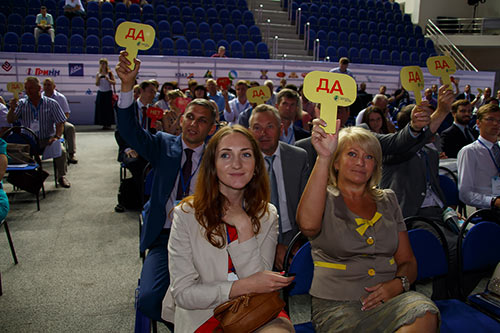 The region is also implementing a food supply security program, the Governor reminded. Agriculture currently accounts for about 20% of the gross regional product of Kursk region. Being a major producer of grain, sugar beet and oilseeds, the region fully meets internal demand for most agricultural products. However, successful development of agriculture requires long-term national and regional strategies for a period of 15-20 years accommodating the interests of both producers and consumers, the Governor emphasized.
The region is also implementing a food supply security program, the Governor reminded. Agriculture currently accounts for about 20% of the gross regional product of Kursk region. Being a major producer of grain, sugar beet and oilseeds, the region fully meets internal demand for most agricultural products. However, successful development of agriculture requires long-term national and regional strategies for a period of 15-20 years accommodating the interests of both producers and consumers, the Governor emphasized.
Besides, Vitaly Bogdanov (member of the Federation Council Committee Committee for Constitutional Legislation and State Building), Alexander Ageev (CEO, Institute for Economic Strategies), Maxim Parshin (Head of the Department of Small and Medium Business and Competition, Russia's Ministry of Economic Development), Mikhail Kobozev (Deputy Governor of Bryansk region), Elgiz Kachaev (Chairman of the Entrepreneurship and Consumer Market Development of St. Petersburg), Alexander Zubarev (First Deputy Governor of Kursk region), Tatiana Voronina (Chair, Kursk regional Duma), Konstantin Babkin (Chairman of the CCI Board for Industrial Development and Competitiveness of the Economy), Andrey Chuev (Head of the Regional Development Directorate, JSC Russian Small and Medium Business Corporation (RSMB Corporation), Vladimir Borgardt (Head of the Regional Policy Department, Industry Development Fund), Andrey Bokov (President, Union of Architects of Russia), Nikolay Kononov (Vice President, Public Health League Charity Fund), Julia Mazanova (Director of Social Policy and Corporate Communications, METALLOINVEST Management Co.), Sergey Zhuravlev (Project manager, Urban Research Center, SKOLKOVO Moscow School of Management), Vitaly Yeremeeev (head of the Agency for Strategic Initiatives representative office in the Central Federal District), Shamun Kagermanov (Editor-in-chief, Selskaya Zhizn newspaper) took part in the plenary discussion on the first day of the Forum.
The plenary session addressed issues of high-tech industry development. Among others, the participants discussed ways to improve the competitive edge of Russian businesses, import substitution and creation of own high-tech industrial capacities in regions, withdrawal of labor force from the shadow market, ways to overcome economic and educational imbalance, the role of business and local government authorities in creating a comfortable living environment and its influence on the economy.
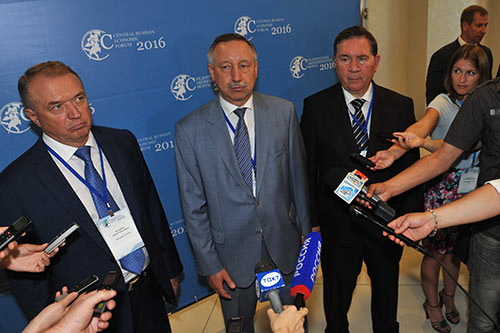 In addition, the eventful business program of the first Forum day included 12 round tables and cross-industry discussions, two master classes, four exhibitions: the already traditional Business competition of Central Russia’s investment projects, the cross-industry discussion “Strategy of creating high-technology industry of the future”, the strategic session “Development of rural areas and strengthening of Russia’s food security”, the round table “Small and medium-sized businesses in the next economy”, the youth strategic session held as a business game, and many others.
In addition, the eventful business program of the first Forum day included 12 round tables and cross-industry discussions, two master classes, four exhibitions: the already traditional Business competition of Central Russia’s investment projects, the cross-industry discussion “Strategy of creating high-technology industry of the future”, the strategic session “Development of rural areas and strengthening of Russia’s food security”, the round table “Small and medium-sized businesses in the next economy”, the youth strategic session held as a business game, and many others.
Besides, the President of Russia’s grants were awarded to young scientists and researchers of Kursk region during the 5th Central Russian Economic Forum. In 2016, 6 young professionals representing higher educational institutions of Kursk South (Southwest State University and Kursk State Medical University) were among the winners of the competition. The grants were awarded by Alexander Beglov, Presidential Plenipotentiary Envoy to the Central Federal District. In addition, more than 100 innovative projects were presented at the exhibition of young scientists’ innovative solutions during the Forum.
This year, for the first time ever, the Central Russian Economic Forum included the children's painting competition “The Country I Want To Live In.” 60 works selected from more than 250 paintings of young artists of Kursk region advanced into the finals. Kursk region Governor Alexander Mikhailov handed the diplomas and awards to the winners.
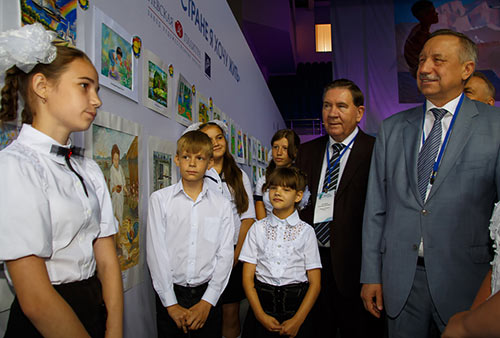 The Forum continued on July 2-3 at the 16th Kursk Korenskaya Fair. Every year, more than 1,000 companies from Russia, CIS and other countries participate in the Fair. This year, several dozen business agreements were signed at the Fair. As part of the excursion program, the CEF 2016 experts visited the Kursk nuclear power plant.
The Forum continued on July 2-3 at the 16th Kursk Korenskaya Fair. Every year, more than 1,000 companies from Russia, CIS and other countries participate in the Fair. This year, several dozen business agreements were signed at the Fair. As part of the excursion program, the CEF 2016 experts visited the Kursk nuclear power plant.
Organizers and Partners
Support
содействии

содействии




















Information
Partners
Information
Partner

Information
Partners




































